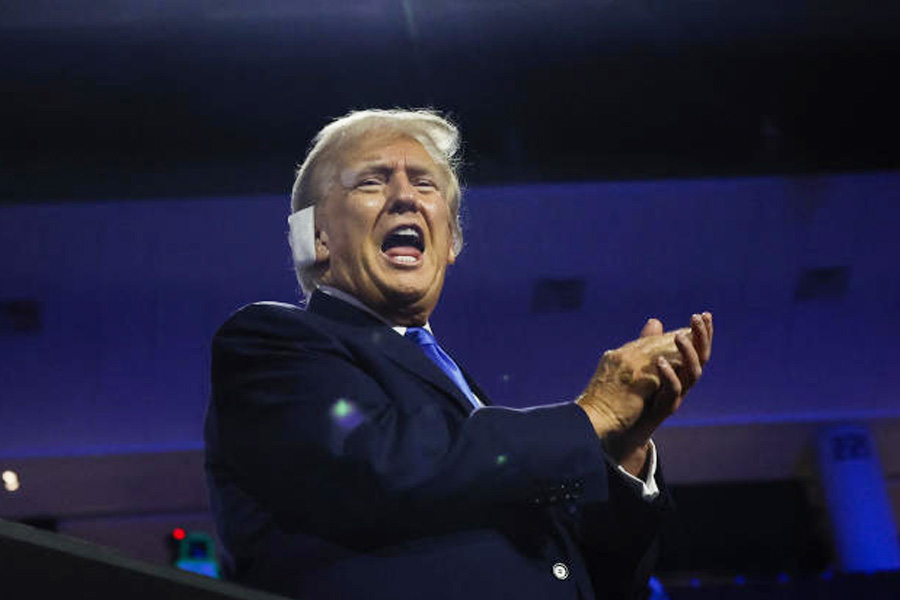The Secret Service acknowledged on Saturday that it had turned down requests for additional federal resources sought by former President Donald J. Trump’s security detail in the two years leading up to his attempted assassination last week, a reversal from earlier statements by the agency denying that such requests had been rebuffed.
Almost immediately after a gunman shot at Trump from a nearby warehouse roof while he spoke at a rally in Butler, Pennsylvania, last weekend, the Secret Service faced accusations from Republicans and anonymous law enforcement officials that it had turned down requests for additional agents to secure Trump’s rallies.
“There’s an untrue assertion that a member of the former President’s team requested additional resources and that those were rebuffed,” Anthony Guglielmi, a spokesman for the Secret Service, said last Sunday, the day after the shooting.
Alejandro N. Mayorkas, the secretary of the department of homeland security, which oversees the Secret Service, said on Monday that the accusation that he had issued the denials was “a baseless and irresponsible statement and it is one that is unequivocally false”.
On Saturday, Guglielmi acknowledged that the Secret Service had turned down some requests for additional federal security assets for Trump’s detail. Two people briefed on the matter, who spoke on condition of anonymity because they were not authorised to speak publicly, confirmed that the Trump campaign had been seeking additional resources for the better part of the time that Trump had been out of office. The denied requests for additional resources were not specifically for the rally in Butler, Guglielmi said.
US officials previously said the Secret Service had enhanced security for the former President before the Butler rally because it had received information from US intelligence agencies about a potential Iranian assassination plot against Trump.
In a statement provided to The New York Times on Saturday, Guglielmi emphasised that the federal agency works in a “dynamic threat environment” and that, in the instances where the Secret Service could not provide additional resources, they supplemented security for Trump’s rallies with state and local law enforcement assets or changed its security plans to reduce Trump’s exposure.
“In some instances where specific Secret Service specialised units or resources were not provided, the agency made modifications to ensure the security of the protectee,” Guglielmi said in the statement. “This may include utilising state or local partners to provide specialised functions or otherwise identifying alternatives to reduce public exposure of a protectee.”
Guglielmi said the federal agency is limited in the amount of resources it can dispatch to events. Secret Service officials have for years complained that the agency is stretched thin, particularly during election season, when it must protect the sitting President, multiple candidates and political conventions.
The fact that the service might have rejected earlier requests for additional support was previously reported by The Washington Post.
The admission will only fuel the intense criticism that Secret Service director Kimberly A. Cheatle is expected to face on Monday when she appears at a hearing with the House Committee on Oversight and Accountability.
The Secret Service had already been barraged with questions over why it had excluded from its security zone the warehouse — about 450 feet from the former President — from which the would-be assassin had fired at Trump on July 13. Trump, whose right ear was injured in the attack, could be seen touching his ear as popping noises went off, before dropping to the ground and being surrounded by Secret Service agents.
The service never held or took part in a public briefing the night of the shooting, while other law enforcement officials held a news conference a few hours after the fact. The service did not hold a public briefing to answer questions in the week after the assassination attempt.
The intensity of the anger between Republicans and top brass at the Washington-based Secret Service after the assassination attempt boiled over during the Republican National Convention. A group of senators chased Cheatle through Fiserv Forum in Milwaukee, saying she was not answering their questions about the shooting.
The Secret Service has faced scrutiny over the way it assigned local law enforcement officers to assist with security at the Butler rally. The agency tasked a sizable contingent of local law enforcement officers with working inside its security perimeter, rather than covering the building where the shooter ended up.
New York Times News Service











